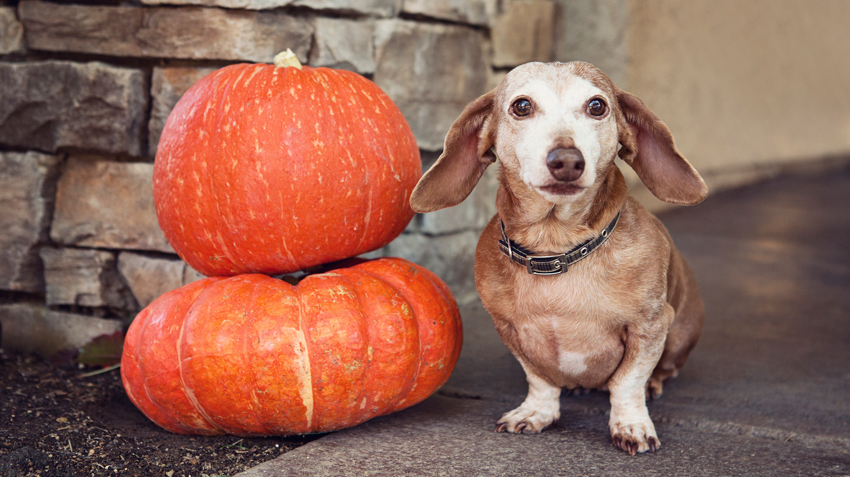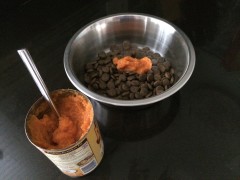
Would it surprise you to know our four-legged companions also are fans of pumpkin? Rumor at the dog park is that the robust squash is a remedy for an upset stomach, promotes a shiny coat and improves a pet’s immune system.
We asked veterinary experts for some insight on the actual benefits of using canned pumpkin in our pets’ meals.
How is Pumpkin Beneficial to Pets?
Canned pumpkin is simply pumpkin in a pureed form. Pumpkin is high in fiber, low in fat and cholesterol and loaded with beta carotene, magnesium, potassium, iron, zinc and vitamins A and C.
All those nutrients sound impressive; do they do anything for our pets?
“The amount of other nutrients in canned pumpkin compared to what is in prepared pet foods is probably too small to make any difference in most cases,” says Dr. Tony Buffington, who has a Ph.D. in animal nutrition, was a resident clinical nutritionist at the UC Davis School of Veterinary Medicine, and is a diplomat of the American College of Veterinary Nutrition.
While there’s no scientific evidence it’s beneficial for a pet’s skin, eyes, coat or immune system, the fiber in canned pumpkin has proven to benefit dogs’ and cats’ digestive tracts. Just in case your dog has an upset stomach from eating, say, rich holiday food accidentally left within his reach.

“Veterinarians have long known the benefits of adding a little canned pumpkin to a pet’s diet regularly,” says Dr. Carol McConnell, retired chief veterinary medical officer for Nationwide pet insurance.
Buffington agrees. “Canned pumpkin sometimes is recommended by veterinarians for its soluble fiber content,” he says. “Canned pumpkin is 90% water, so it is quite nutrient dilute. It adds mostly water and a little soluble fiber to pet foods.”
“It’s particularly good for preventing hairballs,” adds McConnell, “and it’s also good for pets whose stools are either too loose or too hard.”
The fiber in pumpkin can act as a binding solution through a pet’s digestive tract, absorbing excess water and therefore helping pets with diarrhea.
How Much Canned Pumpkin Should Pets Eat?
The amount of canned pumpkin that you add to your pet’s meal will vary based on the species (dog or cat) and your pet’s size. A Chihuahua, for instance, may only need a couple of teaspoons with each meal, whereas a Great Dane may benefit from half a cup of canned pumpkin.
It’s important to point out that grocery stores often sell canned pumpkin on the same shelf as canned pumpkin pie mix. The cans often look the same. Make sure you are buying pureed pumpkin and not pumpkin mixed with spices to be used as pie filling.
Before adding canned pumpkin to your pet’s meals, reach out to your veterinarian as a precaution. Too much canned pumpkin can lead to lose bowel movements and create an entirely different issue. It’s also wise to make sure your pet isn’t suffering from a more serious gastrointestinal issue such as pancreatitis, which can be life threatening.
“As with any remedy,” says McConnell, “I recommend consulting with your pet’s veterinarian on the amount and the frequency and following up if you don’t see a problem resolve.”






